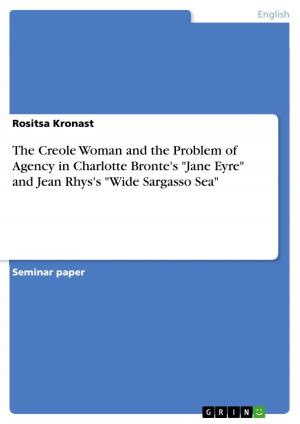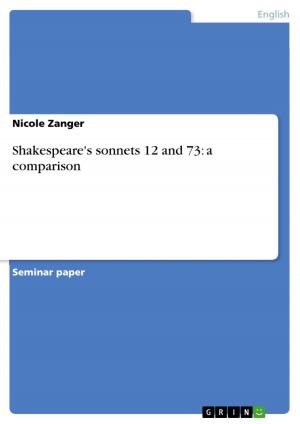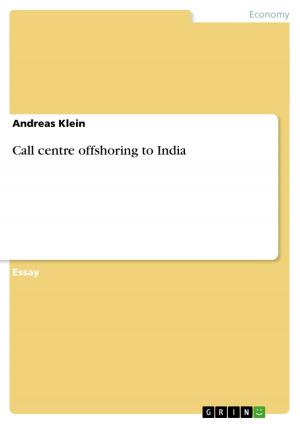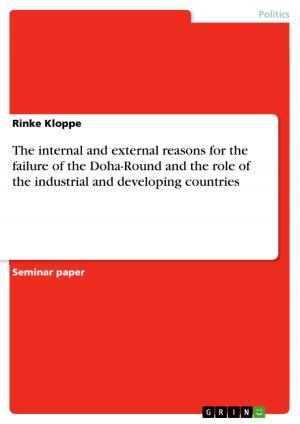| Author: | Britta Fokken | ISBN: | 9783638288682 |
| Publisher: | GRIN Publishing | Publication: | July 7, 2004 |
| Imprint: | GRIN Publishing | Language: | English |
| Author: | Britta Fokken |
| ISBN: | 9783638288682 |
| Publisher: | GRIN Publishing |
| Publication: | July 7, 2004 |
| Imprint: | GRIN Publishing |
| Language: | English |
Seminar paper from the year 2004 in the subject American Studies - Literature, grade: 2,7 (B-), Bielefeld University (Faculty für Linguistics and Literature Studies), course: Short Writings by Oscar Wilde, language: English, abstract: Reading the four comedies by Oscar Wilde, Lady Windermere's Fan, A Woman of No Importance, An Ideal Husband and The Importance of Being Earnest, one finds that the women figures in these plays seem to resemble more or less. Wilde appears to like the use of simplified and stereotyped characters like the often occurring womanwith- a-past, some late Victorian domineering matron or the Puritan. With the impression these give, the reader comes to wonder how Wilde himself thought of them and why they are such recurring motifs. Might they be a mirror for the women in his own life or would that be too far-fetched? I will try to proof in this essay that even though these four plays by Wilde as well as his woman figures give the impression as if they were really similar, they are at most alike, and the characters not easily comparable to persons in Wilde's life. The first three comedies all deal with someone who committed a secret sin in their past and is now confronted with this by meeting an old acquaintance. Though sinners they are in the end pardoned, because they remained good and pure in their hearts, which has to be proved most by Mrs Erlynne in Lady Windermere's Fan. She left her husband and baby to lead a life full of pleasure and returns half a year before her daughter's coming of age, drawn by the wish to join or rejoin society and pressing money from Lord Windermere. He allows this because Lady Windermere would lose all her ideals if she found out about the true fate of her mother, whom she glorified all her life supposing she was dead. Mrs Erlynne sacrifices her reputation in Act III to save her daughter's one, reminded of her own fault twenty years ago and motherly feelings having awoken not wanting her daughter to do the same mistake. [...]
Seminar paper from the year 2004 in the subject American Studies - Literature, grade: 2,7 (B-), Bielefeld University (Faculty für Linguistics and Literature Studies), course: Short Writings by Oscar Wilde, language: English, abstract: Reading the four comedies by Oscar Wilde, Lady Windermere's Fan, A Woman of No Importance, An Ideal Husband and The Importance of Being Earnest, one finds that the women figures in these plays seem to resemble more or less. Wilde appears to like the use of simplified and stereotyped characters like the often occurring womanwith- a-past, some late Victorian domineering matron or the Puritan. With the impression these give, the reader comes to wonder how Wilde himself thought of them and why they are such recurring motifs. Might they be a mirror for the women in his own life or would that be too far-fetched? I will try to proof in this essay that even though these four plays by Wilde as well as his woman figures give the impression as if they were really similar, they are at most alike, and the characters not easily comparable to persons in Wilde's life. The first three comedies all deal with someone who committed a secret sin in their past and is now confronted with this by meeting an old acquaintance. Though sinners they are in the end pardoned, because they remained good and pure in their hearts, which has to be proved most by Mrs Erlynne in Lady Windermere's Fan. She left her husband and baby to lead a life full of pleasure and returns half a year before her daughter's coming of age, drawn by the wish to join or rejoin society and pressing money from Lord Windermere. He allows this because Lady Windermere would lose all her ideals if she found out about the true fate of her mother, whom she glorified all her life supposing she was dead. Mrs Erlynne sacrifices her reputation in Act III to save her daughter's one, reminded of her own fault twenty years ago and motherly feelings having awoken not wanting her daughter to do the same mistake. [...]















